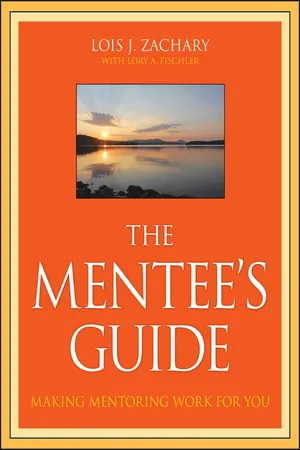
- English
- ePUB (mobile friendly)
- Available on iOS & Android
About this book
PRAISE FOR THE MENTEE'S GUIDE
"The Mentee's Guide inspires and guides the potential mentee, provides new insights for the adventure in learning that lies ahead, and underscores my personal belief and experience that mentoring is circular. The mentor gains as much as the mentee in this evocative relationship. Lois Zachary's new book is a great gift."
—Frances Hesselbein, chairman and founding president, Leader to Leader Institute
"Whether you are the mentee or mentor, born or made for the role, you will gain much more from the relationship by practicing the fun and easy A-to-Z principles of The Mentee's Guide by the master of excellence, Lois Zachary."
—Ken Shelton, editor, Leadership Excellence
"With this deeply practical book filled with stories and useful exercises, Lois Zachary completes her groundbreaking trilogy on mentoring. Must-reading for those in search of a richer understanding of this deeply human relationship as well as anyone seeking a mentor, whether for new skills, job advancement, or deeper wisdom."
—Laurent A. Parks Daloz, senior fellow, the Whidbey Institute, and author, Mentor: Guiding the Journey of Adult Learners
Frequently asked questions
- Essential is ideal for learners and professionals who enjoy exploring a wide range of subjects. Access the Essential Library with 800,000+ trusted titles and best-sellers across business, personal growth, and the humanities. Includes unlimited reading time and Standard Read Aloud voice.
- Complete: Perfect for advanced learners and researchers needing full, unrestricted access. Unlock 1.4M+ books across hundreds of subjects, including academic and specialized titles. The Complete Plan also includes advanced features like Premium Read Aloud and Research Assistant.
Please note we cannot support devices running on iOS 13 and Android 7 or earlier. Learn more about using the app.
Information
Chapter 1
The Power and Process of Mentoring
WHAT WE KNOW ABOUT GOOD MENTORING RELATIONSHIPS
Reciprocity
Learning
Relationship
Partnership
Collaboration
Mutually defined goals
Development
THE POWER OF MENTORING
Kendra’s StoryKendra had been having a hard time at her new job as manager of customer service at a large retail chain. She sought this job to escape from a very toxic situation in her previous workplace, where there was little communication or information sharing and information was used more as a weapon than as a tool for cooperation. At the time, she had assumed that everything that was going wrong in her previous job was her fault in some way. If, for example, someone refused to share information with her, she assumed it was because that person wanted her to fail. On top of this she believed that anyone in a senior position was probably smarter and more competent that she was. As a result, she became overly cautious, untrusting, and lost all self-confidence.Even though the culture of the new organization was completely different from that of her old job, she was finding it difficult to shake the old feelings, suspicions, and self-doubt. Kendra had brought the defensive and ineffective behaviors she learned at the old job to the new one, and it wasn’t working for her. Although the new job had a culture of collaboration and openness, Kendra assumed that people were withholding information and didn’t want her to succeed. Instead of trying to function effectively in her new workplace, Kendra’s strategy was to focus on impressing everyone and making herself look as good as she could. To this end, she took a very top-down approach, quickly implementing a series of changes and dictating new policies. She managed to alienate her colleagues and the people who reported to her in very short order.Kendra was lucky, however, because Sandra, the HR manager took notice. She saw that Kendra was struggling and invited her to lunch one day to talk. Sandra made it clear to Kendra that she believed in her and offered to meet with her regularly to give her feedback and direction. Sandra saw, for example, how Kendra’s lack of confidence was causing her to make decisions without consulting and working cooperatively with her colleagues and reports. At one meeting, Sandra said, “You need to take credit for your ideas. I would like to see the day when your confidence catches up with your ability. You have good ideas, but you aren’t leading.” That comment made a big ...
Table of contents
- Cover
- Contents
- Title
- Copyright
- Dedication
- Foreword
- Preface
- Acknowledgments
- The Authors
- Chapter 1: The Power and Process of Mentoring
- Chapter 2: Preparing Yourself to Make the Most of Mentoring
- Chapter 3: Finding and Getting to Know Your Mentor
- Chapter 4: Establishing Agreements with Your Mentor
- Chapter 5: Doing the Work
- Chapter 6: Coming to Closure with Your Mentor
- Chapter 7: Making the Transition from Mentee to Mentor
- Appendix: Digging Deeper: An Annotated List of Helpful Resources
- References
- Index
- End User License Agreement